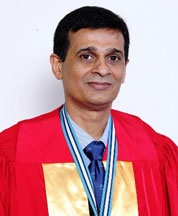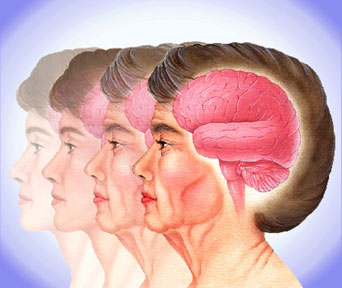|
World Brain Day - July 22
Neurological problems? : Time for a healthy brain workout
By Carol Aloysius
In an age when more people are aging faster, the chances are that
many of them, apart from chronic long standing diseases like diabetes,
cardiac diseases and hypertension, are likely to suffer from Dementia,
Parkinson’s disease and Stroke. Already, signs are in evidence that
these neurological diseases are on a dramatic rise.
Advanced age is not the only cause. Other factors, such as,
concussions from falls and from games such as football and boxing, as
well as alcohol and tobacco abuse , poor diets and poor lifestyles have
collectively done their bit to impair the brain health of most elderly
persons.
|

Dr. A. T. Alibhoy |
President of the Association of Sri Lankan Neurologists, Dr. A. T.
Alibhoy tells the Sunday Observer why a healthy brain is an integral
part of a healthy lifestyle and should thus not be taken for granted.
Excerpts…
Q:World Brain Day was observed early this week. What is World
Brain Day? Why is there a special day set aside for observing it?
A. The World Brain Day was first declared by the World
Federation of Neurology in 2014, and it is celebrated on July 22 every
year. This day is used to increase worldwide awareness of neurological
illnesses and their prevention. This year’s theme will be, ‘ Brain
Health in an Aging Population.’ It is quite clear that in the future,
brain health will be an important factor that will determine the social
and economic well-being of older persons. We wish to encourage good
brain health in the younger population, so that brain damage can be
prevented when they get older.
Q: At what age is a person considered ‘elderly’? What is your
estimation of the world’s aging population?
A. A person over 60 years is considered an older person. The
number of older people in the world is estimated to be more than 800
million, which is about 12% of the world’s population. This figure is
expected to reach more than 2 billion (21%) by 2050. Older persons are
projected to exceed the number of children in 2047. This trend is
already seen in some developing countries. In 2015 in Japan, for the
first time, there were more adult diapers sold than baby diapers!
Q: Is there a similar trend in Sri Lanka?
A. Sri Lanka’s population is also steadily aging. According to
projections, the percentage of those over 60 years will have risen from
9% in 2001 to 17% by 2021 and 29% by 2051.
Q: What kind of health problems are likely as a result of
aging populations?
A. The prevalence of non-communicable diseases such as, heart
attacks, cancers, chronic respiratory diseases and diabetes will
increase with age. The prevalence of brain disorders will also rise all
over the world. Neurological diseases such as, Alzheimer’s disease,
Parkinson’s disease and Stroke are going to increase dramatically with
the aging population. More than 30% of people over 80 years have been
found to suffer from at least one neurological disease.
 Q: You mentioned three neurological diseases . What are their
main clinical features? Q: You mentioned three neurological diseases . What are their
main clinical features?
Alzheimer’s disease is a type of dementia. It is a slowly progressive
degenerative disorder of the mental functions caused by brain disease.
It is characterized by memory impairment, personality changes, impaired
thinking and reasoning and problems with language.
Parkinson’s disease is also a degenerative disorder, characterized by
muscle rigidity or stiffness, tremors, slowness of movement and gait
difficulty.
A Stroke is a disorder that either results from an interruption of
the blood supply to part of the brain or when a blood vessel in the
brain bursts causing a blood clot. A Stroke may present as a sudden
numbness or weakness on one side of the body, sudden speech or visual
impairment and sudden difficulty with walking or balance.
Q: Can lifestyle changes help to maintain good brain health?
If so, share with us some ways we can do this.
A. It is important to stay mentally active and to challenge
your mind. You need to continue to read, write, do puzzles, attend plays
or seminars, play games, do gardening and pursue memory exercises.
It is essential to remain socially active, and engage in community
and leisure activities by volunteering, travelling, or joining social
clubs. Being isolated and withdrawn from society, especially, after
retirement from work does not help to maintain good brain health.
Q: Does being physically active also help maintain good brain
health?
Yes, definitely. It is important to stay physically active too. You
should engage in activities such as walking, jogging, cycling, golfing,
gardening, yoga, dancing, etc. You need to exercise daily. It’s never
too late to start, as making healthy choices at any age is beneficial to
health.
Q: Can head injuries undermine one’s brain health especially
in the case of elderly persons? If so, how can they be prevented?
A. Yes, elderly persons must be careful to avoid frequent
falls which result in repeated head injuries. Head injuries can be
prevented by avoiding road accidents by following traffic rules, wearing
seat belts in vehicles, and wearing helmets while riding motorbikes and
also at construction sites.
You need to put objects out of the way which may increase your risk
of tripping and falling, such as rugs, shoes or electrical cords.
You should turn on lights when you enter a room so you can clearly
see obstacles.
Q: Can one’s occupation make one more vulnerable to head
injuries? There has been a new study to say that footballers who
routinely get concussed can have long term effects on their brains. Your
comments?
A. Yes, those involved in construction work, in mining and in
professions like boxing where the head is constantly exposed to hard
knocks. To cite an example, boxing legend Muhammed Ali developed
Parkinson’s disease at a young age and it is likely that the frequent
head injuries played a role in the boxer’s disease.
Q: Does ingesting balanced nutritious meals play a role in
brain health in elderly persons?
A. Yes. Adopting a healthy diet by reducing saturated fats,
excess salt and sugar drinks and increasing whole grains, fruits and
vegetables in your daily meals can definitely improve brain health.
In addition, it is essential to keep body weight, blood pressure,
blood sugar and cholesterol under control. Avoid fast foods and junk
foods which are high in fat, oil , starch and carbs. All those over
sixty should try to maintain a healthy balanced diet, especially, in a
society where fast foods are the norm. Eat home cooked food as far as
possible using the minimum of oil and take plenty of local fruits. Drink
water rather than sweetened drinks.
Q: What about smoking and alcohol abuse?
A. You should quit smoking and chewing tobacco and abstain
from alcohol abuse as these unhealthy habits can also undermine brain
health.
Q: What are the other common neurological illnesses treated by
Neurologists?
A. Some of the serious disorders that Neurologists treat are
brain infections like meningitis and encephalitis, epilepsy, coma, brain
tumor, Multiple Sclerosis, Myasthenia gravis, spinal cord damage, motor
neurone disease and Guillain Barre syndrome.
Many minor disorders such as, headache, vertigo, backache, sciatica,
facial palsy, carpal tunnel syndrome, tremor and sleep disorders are
managed most often in the outpatient department.
Q: How does one diagnose a brain disorder?
As in all diseases, doctors need to take a good history from the
patient and at times from the accompanying person. A good detailed
history is very essential in neurological illnesses as some disorders
like headache and epilepsy are mainly diagnosed using the history. The
doctor then does a neurological examination which includes assessing the
higher functions of the brain, cranial nerves, and examination of the
limbs by checking the power of muscles, reflexes, coordination and
sensation.
Q:What kind of brain and nerve tests are currently available
in the world? How many of them are available in Sri Lanka?
A. There are two main types of neuro diagnostic tests, namely,
scans such as, CT and MRI and electrophysiology tests, such as,
electroencephalogram (EEG) and electromyogram (EMG). These facilities
are now available in government hospitals in most provinces in the
country and also in the private sector in Colombo.
Q: 2016 is a special year for the Association of Sri Lankan
Neurologists. What activities have you lined up for this special
commemorative year?
A. The Association is celebrating its 10th anniversary this
year and I am humbled that I have been elected as President of the
Association of Sri Lankan Neurologists in this landmark year. As part of
our on going activities , the Association conducts teaching programs
every month for junior doctors where we discuss many different brain
related problems.
Our aim is to provide an up-to-date knowledge of brain diseases to
the medical personnel. We hope to have special seminars for other
supporting staff, like the nurses in the future. We also have regional
meetings twice a year, which have been very successful.
Q: Do you have enough trained neurologists to meet the rising
demand?
A. The number of Neurologists has somewhat increased rapidly
in the last few years. We had less than 15 neurologists about a decade
ago, and now we have over 40. There are many junior doctors in training.
We now have neurologists covering all 9 provinces in the country to
provide the public with care for their Neurological illnesses. We are
encouraging junior doctors to take up neurology.
Q: Your message to our readers?
A. An aging brain is not necessarily a sick brain. It can be
also a healthy brain. During this year, we hope to bring greater
awareness of the neurological diseases associated with the aging
population and the economic and social burdens on health systems
everywhere. National health policies need to take into account this
serious challenge and be prepared to face the future. |

